Losing the Chance to Find Out
Air Date: Week of May 7, 2010
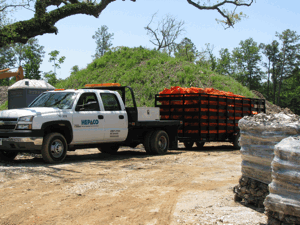
A yard used for an oyster restoration project becomes a staging ground for oil booms in Bayou La Batre, Alabama. (Photo: Ingrid Lobet)
Consider the surface area of the grasses and rushes in a giant estuary. That's what lovers of the Louisiana, Mississippi, Florida and Alabama marshes are doing as they contemplate the petroleum product gushing from the former Deepwater Horizon drill rig. Bill Finch, Alabama conservation director for The Nature Conservancy, takes us along on what he hopes won't be his last walk through the unspoiled Grand Bay marsh. Living on Earth’s Ingrid Lobet reports.
Transcript
YOUNG: It’s Living on Earth, I’m Jeff Young. Protecting the environment is vital to the people of the Gulf Coast – to the fishermen, to the hotel and business owners, to environmentalists, and perhaps to no one more than Bill Finch.
He’s Conservation director for the Alabama Nature Conservancy, and he took Living on Earth’s Ingrid Lobet to one of his favorite places. It’s neither land – nor water -– the pristine Grand Bay marsh.
[SOUNDS OF WALKING]
FINCH: The first thing you notice is the fact that you just see forever, not just out to ocean, but all around this fringe of marsh, all across Grand Bay. The quietness of the marsh, just the absolute lack [sigh] of any appearance of human disturbance for as far as you can see.
[SOUNDS OF WALKING]
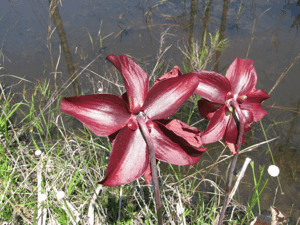
Just on the dryer margin of the Grand Bay marsh in Alabama, there's a bog of carniverous pitcher plants. (Photo: Ingrid Lobet)
FINCH: We’re in the middle of the open marsh and with black needle rush, and you know why it's called black needle rush you can see because when you put your arms down, it will impale your arms.
But then right where we're standing in this river of green that is only about ankle high, this is the salt pan, a salt flat, a special feature of a marsh where salt gets deposited and creates a special community and very diverse. And the great thing about this time of year is that the salt pans that are usually very dry and crusty with salt, they sort of bloom and grow this time of year and they get flooded.
[SOUNDS OF MARSH HEN]
FINCH: And right on the edge of this salt flat, it dips down into the Gulf of Mexico. This whole ecosystem is really about absorbing the Gulf of Mexico this time of year, sucking it up, drawing it in. That contact with the deep ocean this time of year really regenerates this habitat. It's this time of connectivity to the Gulf when it is at its peak. But it’s the very worst time for an oil spill to be coming in because the marsh is so accepting of everything the Gulf throws it.
[SOUNDS OF MOVEMENT OF CLOTHES]
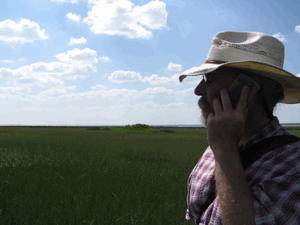
Local conservation legend Bill Finch in the Grand Bay marsh south of Mobile, Alabama. (Photo: Ingrid Lobet)
FINCH: Look at the crabs. Hundreds of crabs. Thousands of crabs. All through this marsh just look at all of them! It's incredibly productive—shrimp, fish of all types—this is a real important nursery area for all types of fish—redfish, which are a real popular sports fish here, speckled trout, shrimp, crabs, virtually everything we eat out of the Gulf.
[SOUNDS OF WALKING THROUGH WATER]
FINCH: Periwinkles everywhere, this is, I don't know which species of marsh periwinkle this is—it’s a snail.
LOBET: It’s climbing up these salt grasses.
FINCH: Up the saw grasses. But it is a periwinkle, a marsh periwinkle, and they are just really abundant. They are the primary grazers of this marsh. When things get disturbed, there is a real concern that marsh periwinkles—the snails—may overgraze a marsh and kill it. What are those disturbances?
The marsh gets stressed by too much oil; maybe the oil kills the chief predators of these periwinkles, which would be crabs. And so you don't have as many crabs and so the periwinkles just go wild and people might say, 'Oh, well it was the periwinkle that killed the marsh'. Well no, they didn't, they have been here for tens of thousands of years. So we may see the loss of this marsh as occurring not just because the oil is toxic, but because it tips the balance to one species or another that gets an unfair advantage because of the oil.
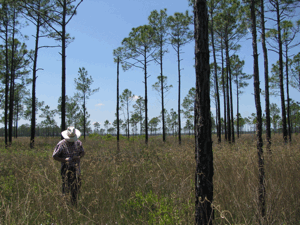
Bill Finch, Conservation Director for the Alabama Nature Conservancy in the slash pine savannah bordering Alabama's Grand Bay marsh. (Photo: Ingrid Lobet)
FINCH: You know the real trouble we have is we don't really know a whole lot about the relationship of crabs to periwinkles, or periwinkles to grass or anything else. And so when the system gets knocked back and we say, ‘Oh we're going to restore this.’ Well we don't know what it was like!
[SOUNDS OF WALKING IN WATER]
FINCH: Look at them, look at them, there they are! See the turquoise on their backs? See that little turquoise streak on the backs of some of those fish? This is that time they are getting ready to spawn. Those are not sailfins. I don't know him.
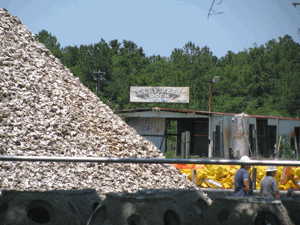
South Alabama residents work to protect their coastline. A mountain of spent oyster shells that was part of an oyster reef restoration project is alongside. (Photo: Ingrid Lobet)
Ah…We need a time to go through and just figure out what's in here! What all is using these saltpans! Look at this male there!! Look at him! Staking his territory out, see him over here? Fluttering around, beating up on the other males, running into them, showing off his tail, showing off his fins—this is that time.
[SOUNDS OF MARSH]
LOBET: You were so busy yesterday and I know that you are so busy today with your phone going off, and yet you’re spending a fair amount of time out here. I'm wondering maybe this is the place you feel that you should be, today.

A yard used for an oyster restoration project becomes a staging ground for oil booms in Bayou La Batre, Alabama. (Photo: Ingrid Lobet)
FINCH: [long pause] These places are largely ignored. We do very little to protect them under the best of situations. But it is important that people know what it is like when it is healthy and how vibrant it is, and how important it is to the entire Gulf of Mexico.
So yeah it is important that I be here. You almost feel torn enjoying such a beautiful place, such a beautiful day, when you fear what’s so imminent. And I want to see it one last time. If this is the last time I want to remember everything that was here. I hope it does break my heart. I don't want my heart to be broken, but I'll leave it out there for that to happen because it is important that we see this. I don't want to forget about it.
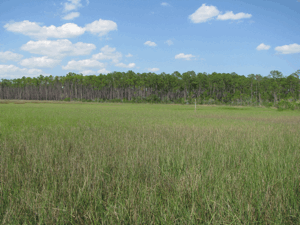
Rare intact slash pine forest reaches down to the Gulf Coast marsh grasses in Alabama. (Photo: Ingrid Lobet)
[SOUNDS OF MARSH HEN]
YOUNG: Bill Finch, Conservation director for the Alabama Nature Conservancy, with Living on Earth’s Ingrid Lobet at Grand Bay Marsh. There are photos—and much more about the situation on the Gulf Coast at our website, l-o-e dot org.
[MARSH SOUNDS FADE]
Living on Earth wants to hear from you!
Living on Earth
62 Calef Highway, Suite 212
Lee, NH 03861
Telephone: 617-287-4121
E-mail: comments@loe.org
Newsletter [Click here]
Donate to Living on Earth!
Living on Earth is an independent media program and relies entirely on contributions from listeners and institutions supporting public service. Please donate now to preserve an independent environmental voice.
NewsletterLiving on Earth offers a weekly delivery of the show's rundown to your mailbox. Sign up for our newsletter today!
 Sailors For The Sea: Be the change you want to sea.
Sailors For The Sea: Be the change you want to sea.
 The Grantham Foundation for the Protection of the Environment: Committed to protecting and improving the health of the global environment.
The Grantham Foundation for the Protection of the Environment: Committed to protecting and improving the health of the global environment.
 Contribute to Living on Earth and receive, as our gift to you, an archival print of one of Mark Seth Lender's extraordinary wildlife photographs. Follow the link to see Mark's current collection of photographs.
Contribute to Living on Earth and receive, as our gift to you, an archival print of one of Mark Seth Lender's extraordinary wildlife photographs. Follow the link to see Mark's current collection of photographs.
 Buy a signed copy of Mark Seth Lender's book Smeagull the Seagull & support Living on Earth
Buy a signed copy of Mark Seth Lender's book Smeagull the Seagull & support Living on Earth

